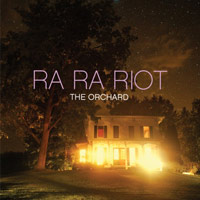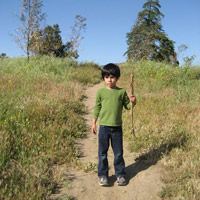
Animal Shapes ep
Tricycle
Chillwave, glo-fi, shit-haze—whatever you want to call it, this micro-genre of low-rent nostalgic synth-pop has positioned itself at the forefront of indie electronic music. And although many of the bands classified under this label are making some fantastic records, it’s refreshing to hear a talented group of youngsters like Geographer who aren’t afraid to eschew the trendy approach in favor of a cleaner sound. On the expanded re-release of Animal Shapes (originally released this past spring), the Bay Area trio utilizes live strings and crystal clear keyboards to create atmospheric indie-pop songs that recall the early ’00s work of the Junior Boys and the Notwist.
Though nominally an EP, the seven songs on Animal Shapes total nearly 30 minutes. Highlights include “Kites,” which lays shimmering synths and an expressive cello over a hip-hop beat, and the delicate yet dynamic closer, “Night Winds.” The only misstep is “Heaven Waits,” a guitar-heavy slow-jam driven by bland, faux-epic riffs. Hopefully, when Geographer releases its follow-up LP, the band will stick to the keyboard-driven chill sessions at which they clearly excel.
Although Animal Shapes isn’t the most original record to be released this year, it showcases a young, skilled band with a respect for subtlety and songcraft. Geographer’s talents are still in development, but if the band’s songwriting catches up to their ambition and confidence, then they could starting setting trends of their own.
David Holmes
MP3: “Kites”

Cloak and Cipher
Saddle Creek
There’s something about Land of Talk’s Elizabeth Powell—and I can’t figure out for the life of me what it is I like about whatever that is. On the third album by the Canadian outfit, Powell and her cadre construct a sound thick with not only guitars, but pop hues. Powell herself can sing and, though those guitars are often fuzzy and clanging, the resulting combination is exceedingly rich. Too much of a good thing? I don’t know, the album is reminiscent of Bettie Serveert, Belly, and the Sundays in different ways, all good points of reference. There’s a lot of idiosyncracies aswirl in the Land of Talk realm as well. Guitars crunch down upon ethereal fits of melody, big drums bump against intimately cooed choruses, and through it all, Powell’s presence glows bright. “Goaltime Exposure” features sparkling refrains that blossom from thud-like monotony. “The Hate I Won’t Commit” sounds like some glorious Swervedriver leftover, and two songs later, “Blangee Blee” swings in a direction more mathematic, but equally dazzling. Trying to explain this album’s appeal doesn’t make it any less puzzling, so you will just have to take me at my word when I say it does it exist.
Stephen Slaybaugh

The Orchard
Barsuk
Aside from seamlessly incorporating classical instruments into ultra-light pop music in a way that felt fresh and completely natural, the magic of Ra Ra Riot’s 2008 debut album, The Rhumb Line, was that every song on the album had direction. That is, each track was like one of those rare visitors that knows exactly when to leave. That being said, if Rhumb Line was the nice neighbor who knows when to exit, then The Orchard is the socially clueless friend that talks all day without ever getting to the point.
Though it’s obvious that the band members have grown as musicians, The Orchard is laden with far too much filler, often in the form of heavy, melancholic string melodies. The cello and violin of Alexandra Lawn and Rebecca Zeller, respectively, are as lovely as ever, yet they convey misplaced sadness, especially when juxtaposed against singer Wes Miles’ cheerful falsetto. The opening title track, sets a sweetly sad tone that weaves its way throughout the album, briefly lifting for a few tracks of the earnest upbeat pop that Ra Ra Riot does best. Miles’ high-pitched vocals, which on previous releases sounded a bit uncertain and strained at times, are now greatly refined and seem to come surprisingly natural, often recalling the lavish (though nowhere near as outlandish) baroque-pop falsetto of Wild Beasts’ Hayden Thorpe.
The album’s plateau comes with “You And I Know.” While it’s nice that Lawn, who provided back-up vocals on Rhumb Line’s standout “Ghost Under Rocks,” has a chance to showcase her sweetly demure voice, the mood is dampened without Miles’ buoyant contributions. Luckily, the energized pop that Ra Ra Riot previously perfected reappears on standout tracks like “Boy,” which contains an intro vaguely reminiscent of the infamous opening riff to Joy Division’s “Love Will Tear Us Apart,” and “Too Dramatic,” which is built upon a solid foundation of Gabriel Duquette’s intricate drum work.
Though The Orchard offers further proof that strings and pop can indeed play well together, the next time around, it would be nice to see Ra Ra Riot focus less on the filler and more on the songs that make them so unique and enjoyable in the first place.
Jennifer Farmer

Natural Selections
Hometapes
Brad Laner’s been around the block, playing in a handful of respected bands since the late ’80s, most notably noisy svengalis Savage Republic and LA shoegazers Medicine. While he’s also contributed backing to a number of other albums and has lately been working as a member of the Internal Tulips, his current focus is on the home recordings he’s been doing on his own.
Make no mistake, though, Laner’s home studio set-up is obviously much more than just some four-track cassette machine or (the 21st century equivalent) a laptop with GarageBand. Unfortunately, all the gear and gizmos in the world couldn’t help this record. Belying its Natural Selections title, the record is plagued by artificiality. Songs like “Lancaster” and “Why Did I Do It” sound pieced together, their stunted vibe suffocating any soul that might have once existed. The former’s multiple vocal tracks and corny guitar are the musical equivelent of a Tab: at once sacharine and devoid of flavor and not the least bit satisfying. Much of the album suffers from the same problems as Laner can’t conjure any magic playing with himself. Obviously, a band’s not necessary to make a great record, but in Laner’s case, his record is completely lacking in cohesion and creative spark.
Stephen Slaybaugh
MP3: “Eyes Close”

Back in the USSA
Smog Veil
The debut album from Cleveland’s Prisoners, Back in the USSA reveals a band already well versed in the kind of loud and rough-around-the-edges ruckus that’s been tumbling out of garages throughout the Midwest for nearly half a century. On the record (limited to just 500 pressed), these five youngsters exhibit both enough whipsmarts to prove their no schlubs and enough willy-nilly cadence to keep things from getting too neat and tidy (i.e. boring). There’s elements of luminaries like the Replacements and the Afghan Whigs in what they do, while the fact that singer Jason Look’s worn-in croak bears more than a passing resemblance to that of Greg Cartwright also brings the Reigning Sound quickly to mind. That latter point of reference is best heard on “Teenage Shatner,” a frantic meshing of three chords and vaguely haunting refrains. Stripped down to just an acoustic guitar, the title track also reveals Look’s ability to channel Westerberg’s barroom blues into a similarly themed lament. Cuts like “Evangeline” and “Society’s Bitch” sound aged beyond these kids’ combined years, their grizzled chords seemingly already marked by crow’s feet. If this debut is any indication, the Prisoners are thankfully already in it for the long haul.
Stephen Slaybaugh
ALBUM REVIEWS
Darker My Love, Alive As You Are
Toadies, Feeler
Lissie, Catching a Tiger
Black Label Society, Order of the Black
Arcade Fire, The Suburbs
Camu Tao, King of Hearts
Autolux, Transit Transit
Los Lobos, Tin Can Trust
The Budos Band, The Budos Band III
El-P, Weareallgoingtoburnin- hellmegamixxx3
Wavves, King of the Beach
Leif Vollebekk, Inland
The Kyle Sowashes, Nobody
Kylie Minogue, Aphrodite
